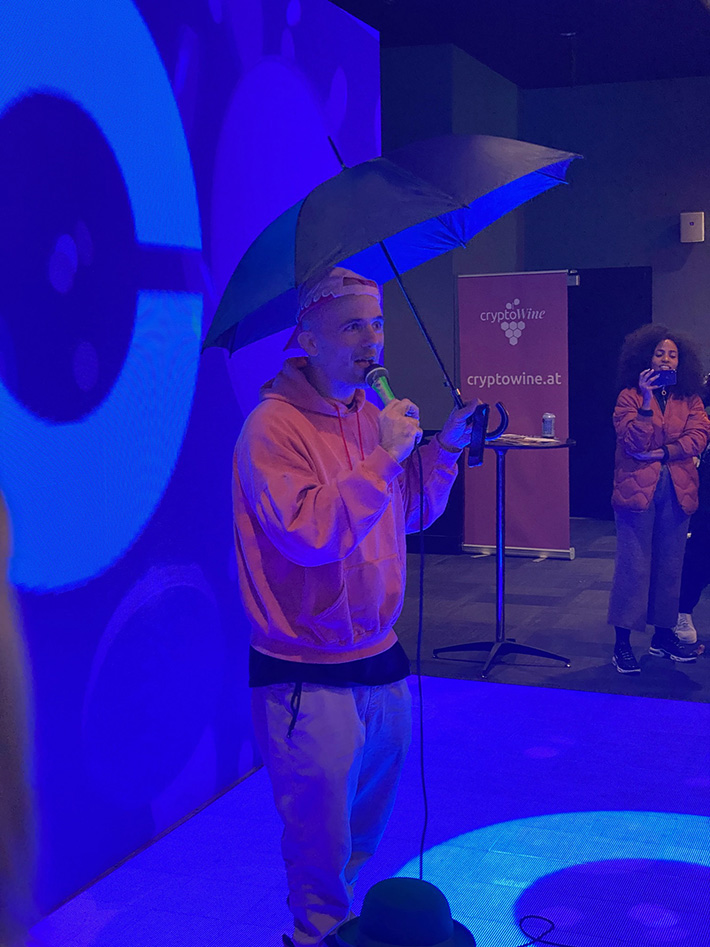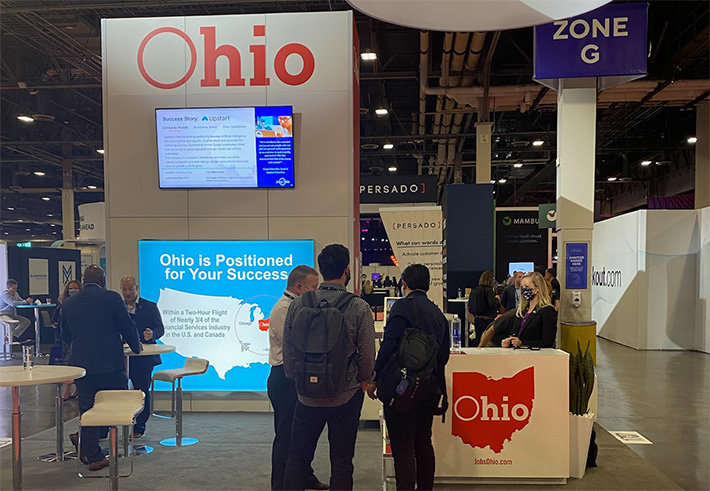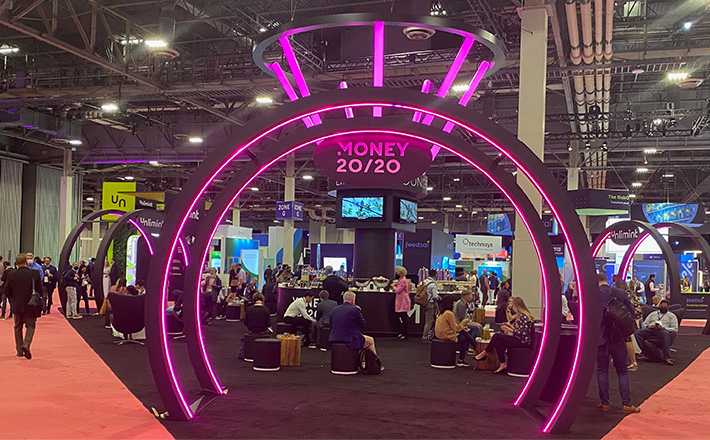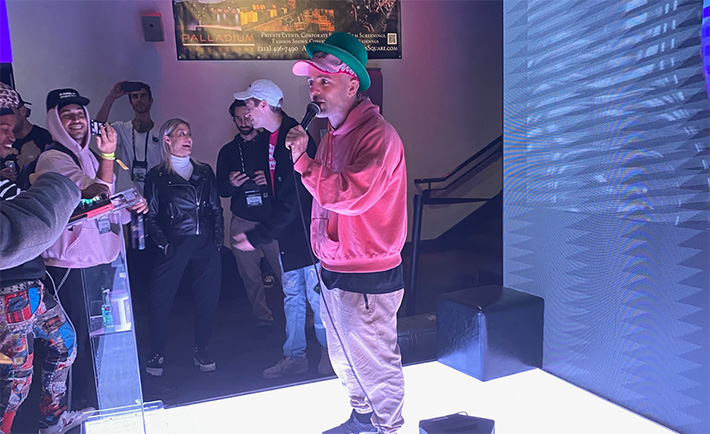Articles by Adam Zaki
Adam is a Reporter from Long Island and graduate of Brooklyn College.
NYC Rapper’s Experience With Fat Joe is Becoming an NFT
November 5, 2021Rami Even-Esh, better known by his rap name Kosha Dillz, went viral last week after hip-hop artist Fat Joe joined him in his ritual of rapping for Knicks fans outside of Madison Square Garden before and after home games. When Fat Joe approached him while he was rapping, Even-Esh’s life changing moment spiraled into a world of opportunities. Now, he’s trying to turn a once in a lifetime experience, along with other highlights from his life, into NFTs.
Even-Esh spoke with deBanked at NFT.NYC on Wednesday about his performance at the event, after he just showed up and was given a stage—subsequently stealing the crowd away from the speaker’s showcase in the next room, and towards his crypto-inspired rhymes.
“Fat Joe heard me rapping on the beat, got on the mic, and tipped me twenty bucks,” said Even-Esh, when describing the incident he wishes to mint. “He got on the mic and spit a verse that I knew word for word, from Big L’s ‘Enemy’, it’s a very classic song. That went to one page, then it went to another page, and then that was it. Game over. You know, we probably hit about nine million views and now more people are posting it.”
After the iconic moment outside of Madison Square Garden, Even-Esh immediately hopped on a flight to Colorado to try and make another connection with Fat Joe during one of his shows there.
“I showed up on my own flight, and went there unannounced. Then he saw me, embraced me, there were bunch of cameras around us. Fat Joe sent his people to bring me backstage, they interviewed me, and then they said man, we’re going to put you on stage.”
 “That’s when I told Fat Joe, I said, my whole life is changing man, we should make this into an NFT.”
“That’s when I told Fat Joe, I said, my whole life is changing man, we should make this into an NFT.”
Even-Esh has had impressive bouts in the music industry prior to this event, which are what he hopes to build upon when he mints NFTs out of his experiences. His website mentions collaborations with rappers like Matisyahu and Rza, and even a tour with Wu Tang Clan. According to Spotify, Kosha Dillz has almost 16,000 monthly listeners on their platform.
Even-Esh has long taken interest in the crypto space, and talked extensively about what NFTs and blockchain technology mean to communities like his who are trying to make a name for themselves while also trying to pay their bills.
“With NFTs, you can mint a moment. There’s so much stuff that happens. That could be a whole series of NFTs, moments that weren’t documented that offend people, or moments of people [that are] in trouble, that could be a thing,” said Even-Esh.
“Moments where great rap music happened but no one ever saw— these could be NFTs.”
Even-Esh appears to be hoping to turn these his minted life experiences into a revenue stream. He claims that all of the places he has been to along with the people he has met create value for potential buyers. “I’m looking to mint more of my experiences because I think my experiences are gold. I have golden life experience.”
Whether it is the NFTs or his music that takes off, the exposure that the moment with Fat Joe gave Even-Esh has set his life on a new path.
He shared his advice to others after appearing to be inspired by the publicity he has received. “Someone told me there’s a million dollars out there for everybody. You have to seek it, go out, and find it.”
The timetable on the minting of his experiences is still undetermined, but that is only because of the amount of attention he has gotten, and the more opportunities that have come his way.
“I’ve been approached by a lot of record deals. Lawyers, agents, major companies, you know that’s what I’m trying to do, investors to take my thing to the next level and sell my story. My job is to tell my story.”
Mississippi Fintech is Innovating Small Business Lending with Brokers in Mind
November 3, 2021
Vergent, a loan management software, is creating a space where brokers and lenders alike can manage all aspects of a deal in one place. Based in Ridgefield, Mississippi, Vergent is trying to innovate the industry with brokers in mind, pairing the small town values of interpersonal engagement and getting to know your customer with the big city ideas of fintech and automation.
“Really what we provide is the technology infrastructure for lenders to reach their end user,” said Bradley Tompkins, Chief Information Officer at Vergent. “Whether that be a small business looking for a loan, we facilitate that acquisition, the origination of that loan, and the servicing of that loan. That could mean recurring payment setups, based upon the lender’s requirements, communication with that customer via email, text, however that is facilitated, and all the different payment options.”
Tompkins talked about how his software is one of the few that brokers in his area are already utilizing to start making deals smoother. With access to all aspects of the deal, Vergent provides an all-in-one suite of options that can turn the process of analyzing a deal or checking out a deal post-funding into a couple of clicks.
“We actually have brokers who use our software to accept applications, originate loans, and then we can either transfer that to a separate portfolio that the lender then manages for servicing, or sometimes we have brokers that service the loans themselves,” Tompkins said. “So there are really a lot of options on how to set that up in the platform, so the lender can have a separate site where they accept applications from multiple brokers, or really any combination of those things.”
The value of a direct relationship with the customer is top-tier according to Tompkins, as he spoke about the next great innovations in fintech not being how to weed the human interaction out, but finding its role that will find the balance between human touch and AI power. “Once you know your customer, you can give them the option to pay you back in the easiest way possible. Understanding how they get paid, their pay cycles, when they have money and being flexible to accept that money when they have it, and giving them those repayment options is the next great innovation.”
When talking about the ability to market his product to a wide audience, Tompkins acknowledged the difficulty due to the size of the industry itself, but touched on the value of networking events like Money 20/20, where Tompkins was pitching Vergent to an international audience.
“We’ve been pleasantly surprised by the amount of lenders we’ve seen, and the amount of opportunities that have come our way from [Money 20/20]. We came here pretty open minded, maybe talk to some payment processors and other vendors that may be able to integrate to us and kind of help expand our network, but really it’s just getting our name out, seeing a little bit of a different segment than what we normally see, and looking at other market opportunities.”
Appalachian Crowdfunder Gives Take on Business Lending
November 2, 2021 View from outside of Pittsburgh, PA
View from outside of Pittsburgh, PAGeorge Cook, whose family has been running a small community bank in rural Appalachia for over 130 years, has grown up in a world surrounded by banking in some of the most rural parts of America. Now the CEO of Honeycomb Credit, Cook has taken to a crowdfunding platform to start lending to businesses in his area. Cook shared his thoughts with deBanked about the state of lending, and how his product competes with ones already available on the lending market.
Cook spoke about how when he growing up, he always had a fascination with the relationship between the consumer and their banks combined with the difficulties for those consumers to get access to capital. “I spent a lot of time thinking about community banking, especially local capital,” said Cook.
When discussing competing products in the lending space, Cook thinks that his product will innovate his area with a style of lending that benefits both the borrower and investor. It appears that he thinks products like MCAs have become partially antiquated.
“I think the downside of [MCA] is inherently when your value proposition is fast money, you’re going to have a negative selection,” said Cook, when asked about fintech’s role in innovating small business lending. “You’re going to have a lot of desperate businesses who need money fast, which means you inherently have to charge a high interest rate and that has [deterred] a lot of business owners.”
 George Cook, CEO, Honeycomb Credit
George Cook, CEO, Honeycomb CreditCook referenced how the complexity of some MCA deals prevent small businesses from using them. “We talk to a lot of business owners who really don’t understand what a merchant cash advance is, they get caught in a debt trap, and it’s not a good situation. For me, I think the next evolution is, not saying merchant cash advances are going away, but I think they’ve been over extended. I think they’ve been overapplied in places where they don’t make sense.”
Cook hinted at new fintech loan products that have elements of MCA popping up in the lending world, as fintech innovates the industry.
“I think now we’re going to see the fintech space start to right the issue, come up with other capital solutions that make sense for small businesses for longer term capital. I think we’re going to see a lot of term loan products that act with different data and different attributes coming to bear, [thus] being able to bank these businesses.”
After working in fintech building big data credit analytics products prior to starting Honeycomb, Cook claims he saw a major issue with small businesses having access to capital long ago. He saw that the qualifications needed for business loans were the same as ones needed for consumer loans, and many small businesses just didn’t qualify for the capital they needed.
“[The system] didn’t work as well for small business lending because you know, small businesses don’t have as much operating history, they don’t have clean data sets, they’re not keeping their books really well, there’s not really a good data aggregator of small business data.”
Cook continued to speak about the issues with banks evaluating a small businesses’ credit and how this was causing a low approval rating. “A coffee shop looks a lot different than a fitness studio and those look a lot different than a manufacturing plant,” he said. “We were actually seeing a really large decrease in small business lending across the country.”
According to Cook, his company allows investors to take their money and put it right back into the community. He also claims that each one of his customers can expect returns ranging from six to twelve percent on an investment.
Honeycomb makes money on success fees, which are the closing costs on the loan. There’s also an investor fee to get a foot in the door.
“One of the things we’ve found is whenever you have retail investors, you have local people in the community voting with their wallets on these small business loans,” said Cook. “So we’re able to do small business loans in a way that no one else has been able to.”
Ireland is Funding Fintech Through Government Investment
November 2, 2021 The Irish government has taken a serious liking to fintech. With a broad history of being active in financial services, the nation believes they can attract companies from around the world to reap the benefits of employing Irish citizens, while also tapping a major source of export revenue through an up-and-coming industry.
The Irish government has taken a serious liking to fintech. With a broad history of being active in financial services, the nation believes they can attract companies from around the world to reap the benefits of employing Irish citizens, while also tapping a major source of export revenue through an up-and-coming industry.
With access to capital for small businesses just as difficult here as it is in the US, a new fintech company looking for start-up cash may be able to turn to Dublin to get a major investment, rather than dealing with a retail investor or a venture capital firm here in the states. Enterprise Ireland, the organzation that runs these programs, is trying to tempt fintech companies looking for a fresh start or an international expansion to start that process in Ireland.
“Enterprise Ireland is the trade development and venture capital arm of the Irish Government,” said Claire Verville, Senior Vice President of Fintech and Financial Services at Enterprise Ireland. “We are a semi state agency and our mandate is to help support indigenous Irish enterprise to grow and expand in global markets.”
Just like in the United States, it is extremely difficult for an Irish business to walk into a big bank and get a loan. It’s in these situations where the Irish government has decided to make a direct investment themselves. Through Enterprise Ireland, according to Verville, the Irish government can provide capital to startups across a range of areas, in exchange for things like loan repayment or government equity in the company.
“In addition to the kind of more traditional trade development stuff that you would see from any government promoting their indigenous businesses abroad, we do invest directly in companies through equity and participate directly as a [limited partner] in funds to funds.”
Verville spoke about how the Irish government has been looking to extend funding to fintech startups for some time. “Our fintech portfolio is over 200 companies now, we have been one of the most active investors in Europe in a long time. We are one of the most active global investors across all sectors, and we’re really focused on early stage capital for fintech.”
 When asked about the decision making process that goes into Irish investments, Verville portrayed it the same as if it was a private firm making the same move. “We will vet like any other investment, make sure we’re comfortable with it, make sure that the business is verifiable, and that we understand the track record of the team,” she said.
When asked about the decision making process that goes into Irish investments, Verville portrayed it the same as if it was a private firm making the same move. “We will vet like any other investment, make sure we’re comfortable with it, make sure that the business is verifiable, and that we understand the track record of the team,” she said.
Through investing in fintech, Enterprise Ireland appears to believe they will give their small business owners better access to capital. If the industry can create a Euro-American hub in Ireland, the latest tech and funding innovations will develop there, giving access to that technology to Irish businesses first. If Irish small business lenders can use Irish technology to help an Irish merchant, everyone wins.
With financial innovation in Europe being leaps ahead of the US, Verville believes the Irish employees working in finance would be better suited to deal with some of these new innovations over Americans because of their familiarity with these systems that are already in place. She hinted at things like EMV cards being around in Ireland for years at the consumer level before they ever made it to the United States.
As far as incentive for profit, Enterprise Ireland isn’t concerned with the success of their investment from a financial perspective as other investment groups are. They instead focus on things like employment numbers and longterm sustainability for those jobs acquired through their efforts in investing in industries like fintech.
“Because we are attached to the government, we aren’t a money-making mission as far as venture capitalists go. We are focused on employment in Ireland, which is partly why it’s so important that the companies are founded in Ireland and that they are building their employee base in Ireland, and on export revenue.”
Verville spoke about how only when businesses in Ireland do well, Enterprise Ireland only does well, too. “We do make money off some of our investments, and that’s government money. We get our budget set by the government department every year, just like any other government agency.”
To be eligible for funding from Enterprise Ireland, a business needs to be based in Ireland, have an Irish LLC, and must have a significant amount of Irish employees. According to Verville, the Irish market is ripe for American small businesses, especially alternative finance.
Five Takeaways from Money 20/20
November 1, 2021
I attended Money 20/20 in Las Vegas last week and spoke directly with the people trying to push innovation through the financial world. Whether it’s payment processing, cryptocurrency, cyber security, data entry software, credit card issuing, or lending processes, millennials with impressive resumes are looking to trim the fat from the financial world with their beloved software.
Below are five takeaways I got from attending Money 20/20.
Crypto is Legit- If you’re still thinking crypto has no value, you’re being naive. The crypto space at Money 20/20 was dominated by international transaction companies, crypto conversion companies, crypto investment companies, and even some doing business lending with crypto. These booths had the most energy around them, and there seems to be general excitement from all the groups about the industry. The crypto community is no longer young kids with big ideas, but legitimate investors and money-people that have an unprecedented amount of interest in investing outside of the US dollar.
The Payments Pool is Overflowing- There are hundreds of companies that are competing to carry your dollars from your wallet to a merchant while taking micro-transactions off the top. These companies are competing heavily, and at Money 20/20, there was no end in sight to them. After a while it got exhausting trying to figure out how one differentiated from another. Is there really any room for MORE innovation or have all the bases been covered already?
Innovation is Blind- A massive amount of innovation is being pitched at these events for types of tasks regarding data collection and entry. The thing is, some software writers themselves have no idea how the industries they are innovating currently work. Software developers from major companies told me they had never heard of a loan broker, as they were pitching software that allows merchants to go directly to the lender for an approval on a business loan. How can something be innovated without the innovator knowing what they’re innovating?
Cybersecurity Seems Light- Cybersecurity had a smaller presence than some of the other major categories. One would think that every fintech company would also need strong cybersecurity. Either cybersecurity is going to be dominated by a small group of players or there is a huge opportunity here that is still untapped.
Networking’s Value is Priceless- After doing virtual business for almost two years, the value of a face-to-face meeting with a potential business partner is well worth the price of admission for the attendees. The people I spoke with said that just to have the ability to get thirty minutes at a table with someone was why they were attending. The connections lounge was the most populated place at the event all three days, as companies from across the globe were finally able to converse without a video camera. Believe it or not, people across the financial world have really gotten sick of Zoom.
Ohio Sends State Reps to Vegas to Pitch Fintech Companies
October 28, 2021 As brokers, lenders, and fintech companies look into having offices outside of New York or California now more than ever before, the state of Ohio used Money 20/20 to pitch their state as the best home for any company dealing with money or the innovations surrounding it.
As brokers, lenders, and fintech companies look into having offices outside of New York or California now more than ever before, the state of Ohio used Money 20/20 to pitch their state as the best home for any company dealing with money or the innovations surrounding it.
With Ohio’s lack of a state-level corporate income tax, relatively low rent, and modest wages compared to places like New York, headquartering in the state is a business decision that Terry Gore, Senior Director of Financial Services in Fintech for Jobs Ohio, referred to as a “no brainer.”
“I’ve been coming to this event for the last four years, the organization probably the last five or six years, and we think we have a very unique value proposition for the audience this year,” said Gore. That [proposition] is fintech, insurtech, in terms of the ecosystem that we have in Ohio, and using that to support their continued growth and expansion.”
Gore broke the pitch down into three main components about why Ohio is the most economically sensible state to headquarter a company in.
“We’re ranked in the top three in terms of headquartered banks and insurance companies, and we’re the fifth largest final services sector in the US market, so from a potential partner standpoint, I think we’ve checked that box.”
 He went on to stress the access to higher education that Ohioans have, arguing that their talent pool is right up there with that of New York and California.
He went on to stress the access to higher education that Ohioans have, arguing that their talent pool is right up there with that of New York and California.
“Most people don’t know, just from a number of citizens’ perspective, we’ve got just under twelve million, we have talent,” said Gore. “We’ve got over 200 colleges and universities, from a talent pool perspective, those companies could tap into that.”
The final component Gore stressed was Ohio’s geography. Nestled in between New York and Chicago, he described it as the perfect place for a company that does a wide array of business across the heartland and the coasts to call home.
“We’re in the eastern standard time zone, we’re just a short two hour flight from three quarters of the financial centers in North America. So you know it’s one of those things where you don’t have to be located in New York to be able to drum up business in New York, you can just literally have a day trip and work that market.”
Ohio has already become a home for major players in the fintech world with companies like Klarna and AllianceData already hosting their headquarters in the state.
“We’ve been able to attract California based companies like Upstart, who moved into central Ohio and opened up their second headquarters, which is now larger than their California based location,” Gore said.
In the midst of their efforts to express all the benefits their state offers, Gore admitted that perception of his state to the rest of the country has a major influence on the decision making that goes into doing business there.
“We want to be viewed more traditionally than what the state has been viewed as, and that’s pretty much focused on manufacturing or a fly-over state. If you’re going to complain about the weather, I can’t help you.”
Networking, Data, and Innovation Dominate Money 20/20
October 26, 2021 It was not only a focus to sell, showcase, network, and collaborate that drove thousands of attendees to this year’s Money 20/20 in Las Vegas on Monday, it was also the desire to share what kind of innovation everyone has been up to.
It was not only a focus to sell, showcase, network, and collaborate that drove thousands of attendees to this year’s Money 20/20 in Las Vegas on Monday, it was also the desire to share what kind of innovation everyone has been up to.
“It’s great to be back, in person, in Vegas,” said Scarlett Sieber, Chief Strategy and Growth Officer for Money 20/20. After last year’s pandemic-induced cancellation, Sieber spoke about how her and her team have been working to make this the best show yet. “We’ve been researching, strategizing, and imagining what a refreshed Money 20/20 would feel like, and it’s great to see it alive.”
The event was mostly dominated by payments services, who all seemed to be competing with each other rather than networking, largely offering the same services with different branding. Coming in at a far second was cryptocurrency, and their effort to share the impact that their industry has had on all aspects of finance. In the speaking sessions throughout the day, almost every panel at least touched on the legitimization of cryptocurrency in the finance world.
In her first time at the event, Brittany Desposito, Senior Business Development Representative at Appian, an enterprise and workflow application building software, spoke about what her company gets out of sponsoring an event like Money 2020. “We get to learn lots of industry trends [while] trying to figure out what we can market more to fintech companies, and what they are looking for, and what challenges they’re facing,” said Despositio.
“This is a great place to sort of get a pulse of what’s going on, see the various interesting players, and what their [new] solutions are”, said Ani Narayan, a Product Lead at Modern Treasury, a payments operations platform. Narayan stressed the positive impact in-person meetings have on companies like his, giving his company the chance to add clients to their book of business that they would never have been able to prior. “It’s a great opportunity to meet people, potential customers, partners, that you could be working with or potentially could work with, so it’s just a great place to bring the entire community together.”
“It’s our first time here, and what we found out is that [Money 20/20] is a real business spot for every party in the industry,” said Erick Padilla, Head of Growth at DAPP, a company who claims to be building the most advanced payment “railway” in Mexico. Padilla spoke about what the value of a show like Money 20/20 can truly be worth to a company like his. “We can meet some of the people that we haven’t had a chance to meet before because we’ve been in different parts of the world, and now we get this opportunity to meet in person, to get to the decision makers we have been looking for.”
When asked about his company’s intention to return to an event of this size, Padilla not only said he would return, but that he would upgrade his ticket to make more of a presence at the event. “We’re going to get a booth next time,” said Padilla.
The show will continue on Tuesday, as companies will be able to have one last chance to possibly make the connection they came to Las Vegas hoping for.
Fintech Happy Hour Discussion Prioritizes Data, Innovation, and Potential
October 22, 2021 In celebration of New York Fintech week, Ocrolus and Codat hosted Thursday’s happy hour with a panel discussion on “the power of combined data”. Pete Lord, CEO of Codat and David Snitkof, Head of Analytics at Ocrolus, discussed how their respective companies are working to innovate the fintech space by harnessing how to most productively make use of their most valuable commodity—data.
In celebration of New York Fintech week, Ocrolus and Codat hosted Thursday’s happy hour with a panel discussion on “the power of combined data”. Pete Lord, CEO of Codat and David Snitkof, Head of Analytics at Ocrolus, discussed how their respective companies are working to innovate the fintech space by harnessing how to most productively make use of their most valuable commodity—data.
The event was open to those in the fintech space, but primarily served as a mixer and networking event. The panel had discussion topics, moderator questions, and an audience question-and-answer session.
After the event, Snitkof spoke about how the choices available to potential borrowers are so vast, that this vastness of funding sources may be creating a knowledge gap between borrowers and funders. Through fintech, Snitkof appears to believe this knowledge gap can be bridged.
“I think awareness is a really big deal where in many cases people think the only place they can go get a loan is their bank,” said Snitkof. “In fact, there are more lenders out there and they’re all different, which is the important thing. They all use different data, they all use different technology, they all might offer different types of products, and if you’re a borrower, it pays to do some learning.”
When speaking about fintech companies themselves, Snitkof stressed the need for a company to find their niche. “I think what fintech companies can do is really try to make clear how they’re different. The most successful fintech companies that I know of, at least the most exciting ones right now, are ones that don’t try to be everything to everyone.”
Codat, the main showcaser of the event, have people that are equally as excited about both their company and industry’s potential outlook.“I think fintech is just getting started,” said Lord, when asked about Codat’s role in innovating the fintech space. “[Our] role is in connecting the different systems that are used by small businesses that enable them to thrive and to be able to do more business.”
Lord spoke about the increase in speed of the logistical processes that his company creates by innovating antiquated data entry systems via the Codat platform. “[We] provide a layer of intelligence on top of the data that we make available to clients to allow them to get more value faster, and then provide a better experience using that to their small business customers.”
Codat employees also spoke about the state of fintech, along with their direct involvement in changing the way financial transactions occur across a vast array of industries and institutions.
“I think small business owners and people who work at large corporations or medium sized businesses are now expecting similar experiences [like] the financial services they use to power their everyday activities,” said Nick Codron, Codat’s Strategic Account Manager of North America. “All of these software companies are moving into financial services, there is a big play for being the [top] platform and the central business operating system.”
Other employees believe that it is not just a desire for business owners to integrate technology into the financial services space, but a game of catchup; hinting that fintech, as a community, is behind the eight-ball when it comes to the pace of innovation.
“I think there’s a lot of catching up the world needs to do in terms of digitizing financial services not just for small businesses, but for consumers and large corporations,” said Andrew Rho, who recently just transitioned to a Strategy Management position at Codat. “If you can have easy access to those products, services and design concepts and materials that help your dreams come true, that’s an e-commerce business right there.”
“In that sense, you see fintech touch everything,” said Rho.
































